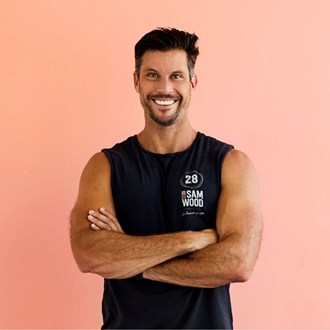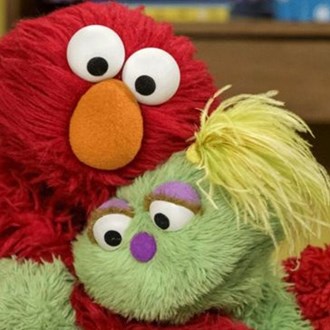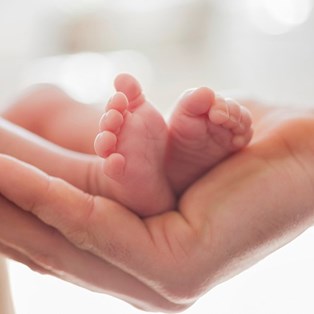Meet the amazing mum-of-five who helps Australia's most traumatised children

She's simply amazing...

By Keeley Henderson
October 22 2018
Mum-of-five Lee Cameron has devoted her life’s work to helping some of the most vulnerable and traumatised children in Australia.
Describing one of the most heartbreaking cases of her career, when she worked in child protection, the Melbourne local recalls how she rescued a three-and-a-half year old epileptic girl who was forced to sleep with the family dogs because her mentally-ill father believed she was possessed by the devil.
‘By the time we discovered her she was non-verbal, she didn’t know how to eat so she ate with her hands, most of her teeth were rotten, she was developmentally and cognitively very, very delayed,’ Lee tells Practical Parenting.
Though the little girl’s behaviour was too difficult for foster carers, Lee says she thrived once being placed in a family group home. ‘Her carer was absolutely magnificent. She took this wild little girl who had never slept in a bed, and grunted, and took her to a point where this kid was at school, she had basic language, she could eat with a knife and fork, she had friends. If she hadn’t been found at three-and-a-half it beggars belief what would have happened to her.’

Getty
Another case which will always haunt the 50-year-old mum is the little boy whose mentally ill mother convinced him that child protection officer Lee was really a monster who was there to peel the flesh off his bones.
Lee had gone to the little boy’s school to see him.
‘I knew this little boy, I had been working with him for a couple of months. He came into the room, took one look at me and absolutely went bananas, screaming, crying, climbing up the back of the principle. He was completely terrified of me.
‘That’s the one that really makes me cry because his terror was very real,’ Lee says, breaking down.
‘In the course of talking to him very gently and very quietly, he eventually was hugging me and crying so he understood that I was safe. I was completely covered in his tears. I was soaked because of how much he’d cried and I remember going home that night and walking through the front door and not even stopping to take my clothes off before I got in the shower.
‘I just had to wash his tears off me because he was so frightened. It’s such a cruel thing to do to a little boy. But he went to a permanent care family who were amazing. The last time I heard he was a young adult and working and doing fabulously well.’
Now, as Head of Care at the Alannah & Madeline Foundation, some of Lee’s most challenging work is in connection with the Children Ahead program, which provides kids who have experienced horrendous trauma with the tools and help they need to stop them falling through the cracks.
‘These are deeply traumatised kids who have seen things that no child should see,’ she says.
The foundation recently stepped in to help one little girl, who witnessed a murder.
Unsurprisingly she was struggling at school and was prone to angry outbursts, which made her hard to manage and sent the other children running scared.
Lee’s team worked with the teachers and advised them how to make small but life-altering practical changes which have seen the little girl thrive.

Lee Cameron
They set up a little teepee so that when she started showing signs of not coping the teachers could gently direct her to sit in there.
‘It’s just a quiet space so she can’t see kids looking at her, and we have this thing she can blow into to help her regulate her breathing and bring her heart rate down. Little strategies like that are our bread and butter,’ says Lee.
They also introduced a keyboard which the youngster was able to use as a form of self-expression.
The results, Lee says, have been astounding.
‘This is a little girl who wouldn’t make eye contact with anyone 18 months ago. Who had no friends at school, who was really a bit lost in her own world.
‘Now she is at a point where she can take turns, she likes to play card games. She has two little boys who she plays with. She makes eye contact with people and will show the worker what she can do on the keyboard. She’s demonstrating pride in herself, something she’s never had before. She’s on the road to recovery, well and truly.
‘Our goal is to help the kids build their resilience and understand where their strengths are. Give them strategies to understand their own bodies and how they are managing their grief, or their anger, or their sadness, and how to recognise the signs when they need help.
‘It’s a multi-pronged approached to getting that kid to not just survive their life, but to thrive in it.’

Getty
What is the Alannah and Madeline Foundation?
The Alannah & Madeline Foundation is the leading national not-for-profit organisation working to protect children from the effects of violence and bullying.
It was set up by Walter Mikac in memory of his daughters, Alannah and Madeline, aged six and three, who were tragically killed with their mother and 32 others at Port Arthur, Tasmania on April 28, 1996.
The Foundation cares for children who have experienced or witnessed serious violence. It works to reduce the incidence of bullying, cyber bullying and other cyber risks and it advocates for the safety and wellbeing of all children.
Its programs are in one-third of Australian schools and more than 75 per cent of Australian public libraries. Its work also supports around 10,000 children in refuges or foster homes across the country every year.
Practical Parenting has teamed up with the Alannah & Madeline Foundation to shine a light on its Buddy Bags program. The charity supplies backpacks of basic essentials to children in emergency accommodation across the country. More than 85,000 have been delivered to date.
Buddy Bags are backpacks containing new and essential items, such as a toothbrush, toothpaste, hairbrush, facewasher, pillowcase, pyjamas, socks and underwear, as well as a book, photo frame, activity kit and the all-important teddy bear.
As well as providing material aid, Buddy Bags help restore a sense of safety and security into children’s lives during this time of trauma, which is one of the vital first steps to recovery.
You can donate
A $10 donation will help by buying a teddy bear for a Buddy Bag and a $50 donation contributes to an entire Buddy Bag. But any donation is gratefully received.













